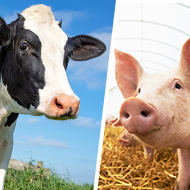Pig and cattle health projects receive funding boost

The funding will help to progress two projects focussing on pig and cattle health.
Researchers at the Pirbright Institute have received €3.5 million in funding to proceed with two projects designed to improve the health of cattle and pigs.
The funding will be used to tackle three livestock viruses - bovine respiratory syncytial virus (BRSV) in cattle, and porcine reproductive and respiratory syndrome virus (PRRSV) and African swine fever virus (ASFV) in pigs.
The first project, named NEOVACC, aims to develop vaccine strategies to improve the protection of newborn animals against BRSV and PRRS - the latter of which costs the global pig industry an estimated €1.5 billion a year.
Professor Simon Graham said: “We are excited to begin work on the NEOVACC project. The consortium brings together a range of complementary expertise and knowledge to apply to our novel vaccine strategies, which we hope will provide young animals with enhanced protection against two important endemic diseases.”
The second project, named ASFVInt, aims to identify the roles of around half of the 150-170 genes contained in the ASFV genome. This fatal pig disease was thought to have caused China US$141billion in direct economic losses in 2019 and continues to pose a risk to economies across the globe.
Led by Pirbright’s Dr Chris Netherton, the project will see six partners receive €1.4 million to investigate 80 ASFV genes and decipher what they each do during infection.
The team will use the data to see if there are specific genes that are important for replication or that the virus uses to avoid the pig immune response - research that could lead to the development of new antivirals or vaccines.
Dr Chris Netherton said: “Control measures against ASFV are limited by our relatively poor understanding of how ASFV manipulates the host immune response.
£The ASFVint project will help fill this gap by bringing together expertise from a range of disciplines brought by partners drawn from across Europe. Together we hope to build a road map which help uncover novel ways to combat this fascinating but dangerous virus.”



 The Federation of Independent Veterinary Practices (FIVP) has announced a third season of its podcast, Practice Matters.
The Federation of Independent Veterinary Practices (FIVP) has announced a third season of its podcast, Practice Matters.